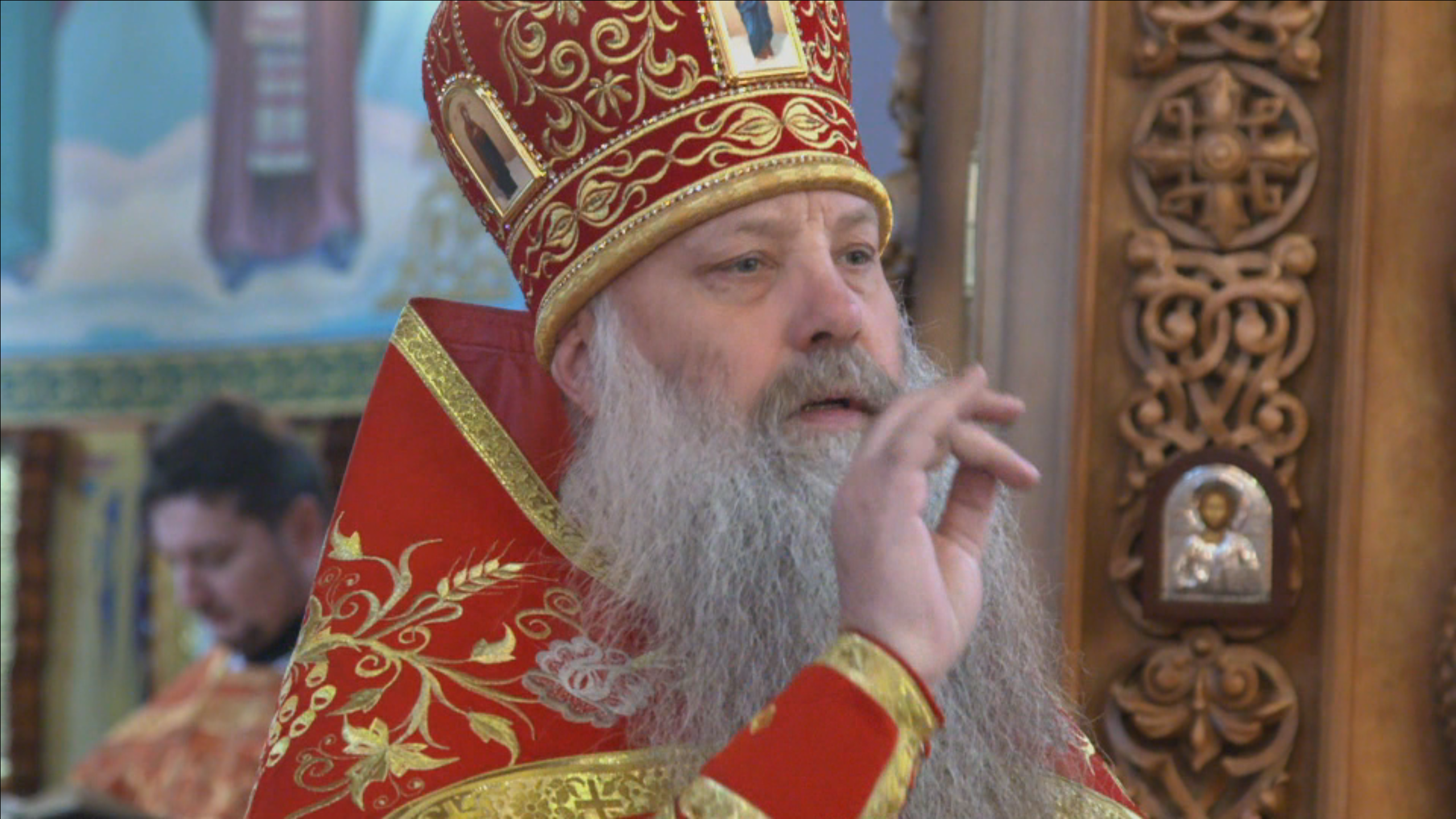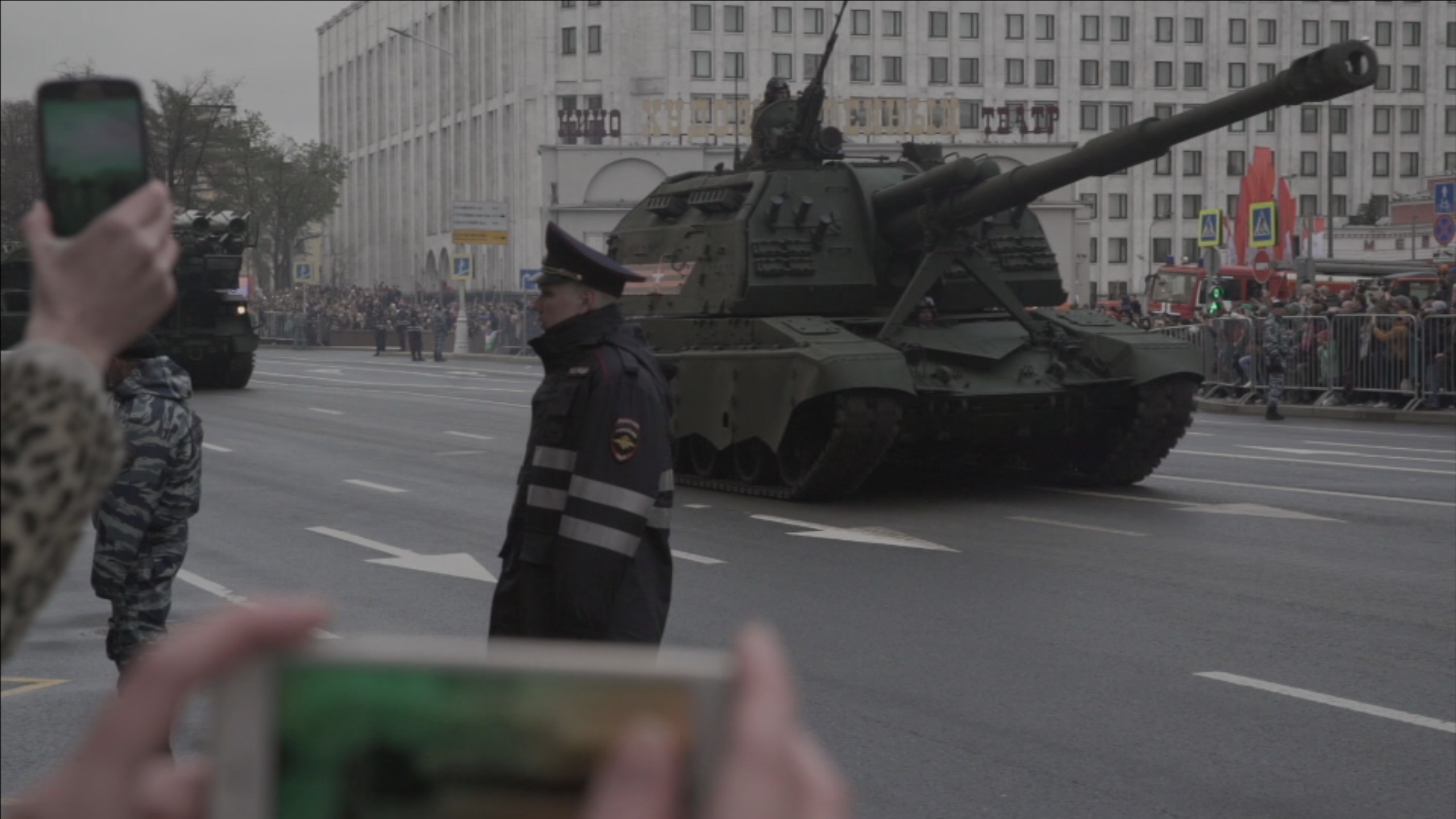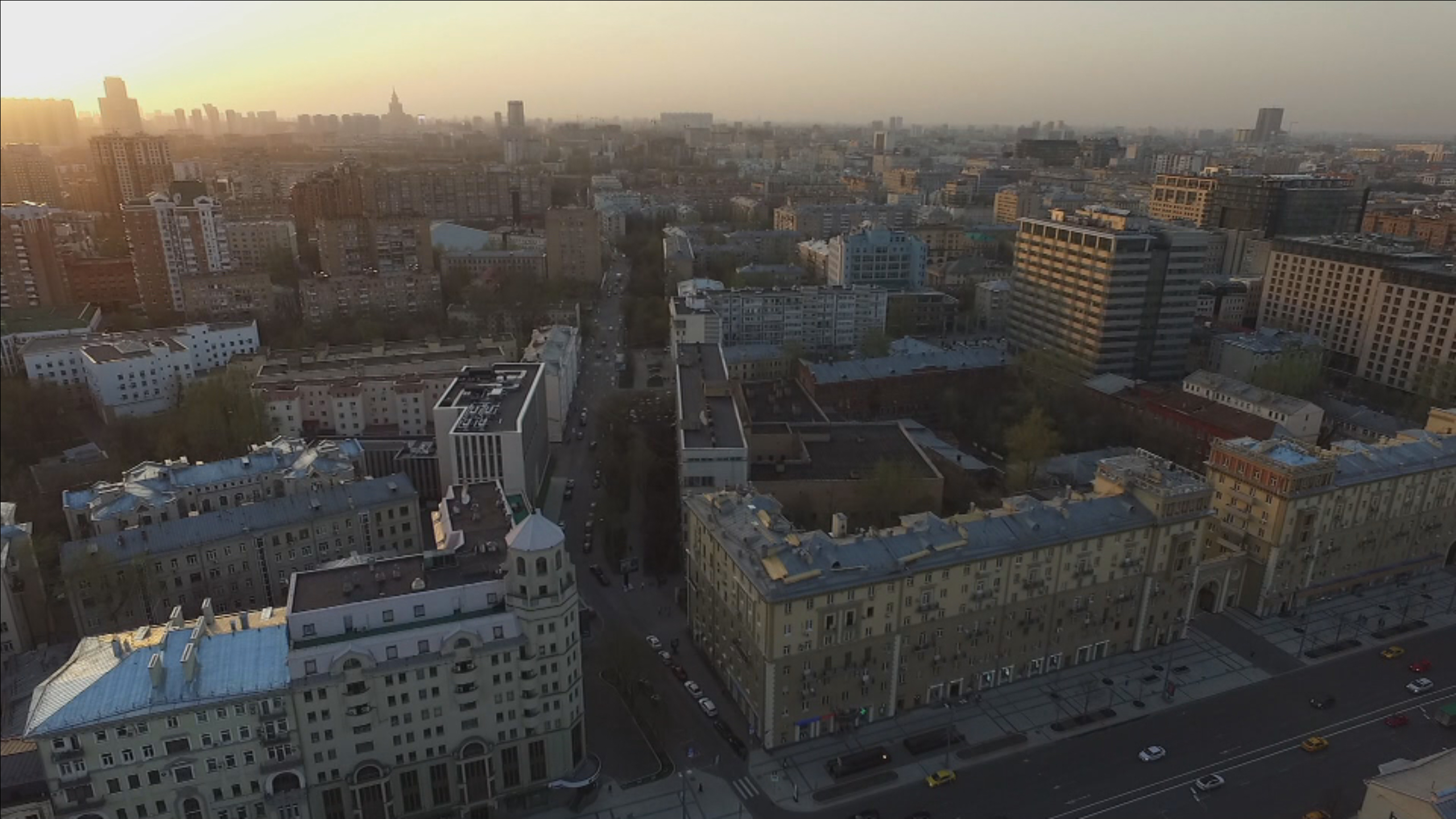
JUDY WOODRUFF: This week, we begin our weeklong series Inside Putin's Russia.
With support from the Pulitzer Center on Crisis Reporting, special correspondent Nick Schifrin and producer Zach Fannin traveled to more than a dozen cities, conducted 40 interviews, and were arrested twice. They will report later on Russian propaganda, Russia's opposition, Russians who join ISIS, and the tense relationship with the U.S.
But the first story explores a new Russian identity. It's a combination of religion, old Russian traditions, and rediscovered patriotism.
This new identity helps explain how people in today's Russia think, how President Putin acts, and why he remains popular.
We begin in the southern city of Krasnodar.
NICK SCHIFRIN: It is Sunday morning in Russia's conservative south. More than 70 percent of Russians are Orthodox Christian. And under President Vladimir Putin, the church has been revitalized.
Archpriest Ivan Garmash is known as Father John. He tells parishioners there's only one way to be a true Christian. And he says being a true Christian is the only way to be a true Russian.
FATHER JOHN, Archpriest (through interpreter): The state and my faith are united. They can't be separated. The values of the church and the state coincide.
NICK SCHIFRIN: In Russia, faith is patriotic. The Orthodox Church criticizes liberal Western values as heresies, while Orthodox priests bless Russian weapons and endorse Putin politically and personally. The president's faith increases his popularity.
FATHER JOHN (through interpreter): He is a religious man, and he takes part in the divine worship with the people in churches. What the president is doing, what the government is doing, of course, we support it, because he acts conscientiously and truthfully.
NICK SCHIFRIN: Today's reenergized Orthodox Church helps create pride in a shared religion.
And historic Russian symbols, like Cossacks, help create pride in shared traditions; 500 years ago, Cossacks became the Russian tsars' henchmen. They were famous and feared and helped police the Russian empire's borders. The Soviets persecuted them.
Today's Russia restores them. Cossacks fills Krasnodar's streets at an annual parade. They believe Russia should be governed by tradition, rather than the rule of law.
VLADIMIR GROMOV, Retired Cossack Commander (through interpreter): Only the nation that has kept its traditions and honors them more than the law deserves respect. The strength of a nation is in its traditions.
NICK SCHIFRIN: For 17 years, Vladimir Gromov led the regional Cossack army. He revitalized this event, and helped get the Cossacks state sponsorship. President Putin awarded him the Order of Friendship Medal. Gromov considers Putin the custodian of Russian pride and stability, preventing the chaos of the 1990s.
VLADIMIR GROMOV (through interpreter): If it wasn't for President Putin, Russia as a state would be struggling through the toughest times now, and possibly may have ceased to exist. Only Putin has saved the state from total collapse.
NICK SCHIFRIN: And, in return, Cossacks do what they feel saves Putin.
WOMAN (singing): Putin will teach you to love the motherland.
NICK SCHIFRIN: During the 2014 Olympics, the band Pussy Riot performed a song that disparages Putin. Cossacks unleashed their centuries-old tradition of vigilante violence.
Last year, Cossacks doused the main opposition leader, Alexei Navalny, and attacked his staff. And in Kaliningrad, when a small group of demonstrators demanded the government change its foreign policy, a Cossack beat up 63-year-old protester Yevgeniy Greishen. He lost 80 percent of his eyesight.
YEVGENIY GREISHEN, Protester (through interpreter): If the regime can't suppress civil protest through legal means, they punish the people through affiliated associations, like the Cossacks. The regime acts through them.
NICK SCHIFRIN: Why have the authorities cracked down so much?
YEVGENIY GREISHEN (through interpreter): In Russia, statehood comes first, and human rights come last. They use any means to prove the state is the most important, more important than a human.
NICK SCHIFRIN: The idea that the state is more important than the people is actually not new. Russians have long had a collective identity.
ALEXANDER DUGIN, International Eurasian Movement: For us, the man is collective concept. We consider ourselves to be the part of the whole. So, to be Russian means to share the same cultural and historic identity.
NICK SCHIFRIN: For years, TV fixture and firebrand Alexander Dugin inspired the Kremlin's ideology. He says Russia's collective identity comes from patriotism, projection of power, and respect for the ruler. Putin's tapped into all three, connecting today's Russia to its imperial grandeur.
ALEXANDER DUGIN: Patriotism is organic. It is not artificial. Empire, or state, is not something additional or artificial, because it is our breath, our skin, our organic way of life.
NICK SCHIFRIN: Today's Kremlin uses that patriotism to try and unite the population and convince them only a powerful state can protect them from enemies. Enemy number one? The U.S.
ALEXANDER DUGIN: America is on the brink of a revolution.
NICK SCHIFRIN: Dugin and the Kremlin accuse the U.S. of humiliating Russia by expanding NATO to Russia's borders and supporting revolutions in former Soviet states and satellites. Dugin advocates fighting back by attacking the West with asymmetric war.
You talk about introducing geopolitical disorder, actively supporting dissident movements, extremism, racist, sectarian groups. This seems much more than just…
ALEXANDER DUGIN: It's exactly as you do. It's exactly what you do. You are supporting separatist group. You're supporting any kind of nationalism, including Russian nationalism that is against Putin. My words are the mirror what you are doing. It is mirror, and you are frightened so much because you are doing the same thing against us.
NICK SCHIFRIN: In Ukraine, that philosophy was weaponized. In Eastern Ukraine, Russia aids local separatists who fight against a Ukrainian government that's pro-Western.
And in 2014 in Crimea, Russia helped install separatist leaders who rushed through a referendum that led to Crimea's annexation. The day of annexation, Putin gave a speech combining religion, patriotism, and imperial history. He said the West had been subjugating Russia, and Russia was finally demanding respect.
PRESIDENT VLADIMIR PUTIN, Russia (through interpreter): If you compress the spring all the way to its limit, it will snap back hard. Russia is an independent, active participant in international affairs. Like other countries, it has its own national interests that need to be taken into account and respected.
NICK SCHIFRIN: It's impossible to overstate how transformative Eastern Ukraine and here, Crimea, have been to recent Russian memory.
After the Crimea annexation, Putin's popularity spiked to nearly 90 percent. Russians told pollsters that suddenly they felt like a superpower again. And Russians all over the country mobilized. That's Denis Solomin in 2014 fighting in Eastern Ukraine. He's a former soldier who was working a mid-management retail job when he quit and crossed the border.
DENIS SOLOMIN, Returned Fighter (through interpreter): Now we hear that behind us. There's an intense battle. Mortars and shells are raining in our direction.
NICK SCHIFRIN: Solomin went to war because of that collective Russian identity. He believed the Ukrainian government was attacking ethnic Russians.
DENIS SOLOMIN (through interpreter): Those people who were under fire, I identified them as Russian people who need protection by those who can at least hold a weapon.
NICK SCHIFRIN: What was it about them that you felt, I need to help them?
DENIS SOLOMIN (through interpreter): Those are the people with the same culture as mine, the same language, the same world view.
NICK SCHIFRIN: He was convinced of that by propaganda. In May 2014, dozens of pro-Russian separatists died in Odessa, Ukraine.
DENIS SOLOMIN (through interpreter): It probably became the pivotal moment. There was a lot of information about how people were simply getting beaten and killed.
NICK SCHIFRIN: Russian media exaggerated the attack, even using an actress to play a victim. We know she was an actress because she appeared in unrelated pro-Russian stories as three entirely different people.
And that disinformation campaign convinces the Kremlin's critics the new Russian identity is manufactured and a product of deception and repression. Sometimes, that repression shows up in masks, guns and camouflage. Those are special forces surrounding 66-year-old Ilmi Umerov, in the jacket and jeans.
Umerov is a leader of the Tatars, a Muslim minority in Crimea. He and other Tatars fight the Russian annexation. In response, many Tatars have been jailed on questionable charges, and Umerov was thrown into a local insane asylum.
ILMI UMEROV, Tatar Leader (through interpreter): So, all this together, we call one big act of intimidation. The purpose is to silence some, and keep others ignorant to turn them into zombies so they think the same thing. These are the necessary conditions in order for the people to be loyal to their government.
NICK SCHIFRIN: But do you acknowledge that that is the majority of the population who feels that way?
ILMI UMEROV (through interpreter): Of course. Of course. We can't say that this is a stupid population or stupid people. They are just living in a constellation of fear. And the propaganda machine rolls over them like a steamroller.
NICK SCHIFRIN: Umerov may accuse Putin of manipulating the population, but under Putin, Russia has revitalized the majority religion, brought back historic traditions, and projects power.
So, until there's an alternative, he's considered the creator and will remain the caretaker of the new Russian identity.
For the PBS NewsHour, I'm Nick Schifrin in Krasnodar, Russia.
JUDY WOODRUFF: And we continue our series Inside Putin's Russia tomorrow, examining the use of propaganda by the state.

Education Resource
Meet the Journalists: Nick Schifrin and Zach Fannin
Pulitzer grantees Nick Schifrin and Zach Fannon spent eight weeks in Russia exploring what the...





